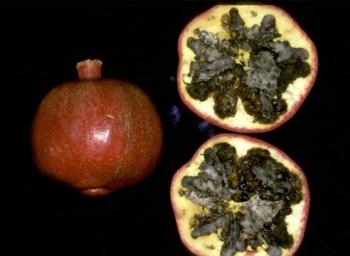A mysterious sudden crippling or death of pomegranate trees may be due to cold temperatures, said a story in Western Farm Press.
Three farmers and Themis Michiliades, UC Davis plant pathologist based at the UC Kearney Agricultural Research and Extension Center, agreed that low temperatures have a lot to do with the problem. Michailides cited an Iranian research paper that showed similar cold snap damage. Michailides and Richard Molinar, UC Cooperative Extension farm advisor in Fresno County, said damage from dieback this year was more common in sandier soils, perhaps because heavier soils hold moisture.

Claude Phené, a retired USDA-ARS researcher, discussed a two-year-old pomegranate irrigation and fertigation trial at Kearney.